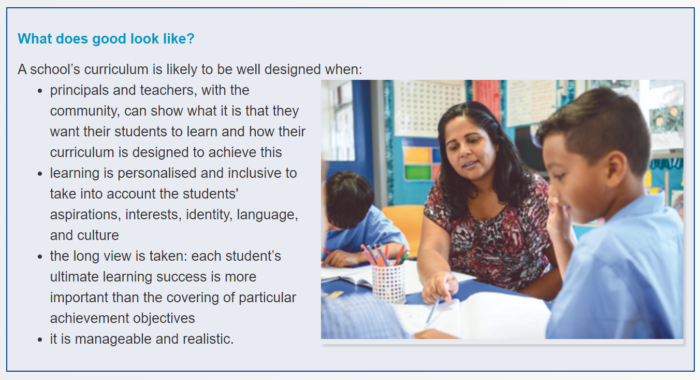What is a local curriculum?
By Kerry Hall on May 20, 2019 in Local curriculum design
Local curriculum is causing a buzz around many schools and I hear many leaders and teachers talking about what it means and what they should be doing. I firmly believe that every school has the main elements of their local curriculum alive and kicking within their walls – however, sometimes it is not recognised as such.
An easy to remember definition is that your local curriculum is the way that you bring The New Zealand Curriculum (NZC) to life in your school. At the heart of the local curriculum is improving learning for all students, so in order to meet the needs of your learners it should:
be responsive to the needs, identity, language, culture, interests, strengths and aspirations of your learners and their families
have a clear focus on what supports the progress of all learners
integrate Te Tiriti o Waitangi into classroom learning
help learners engage with the knowledge, values, and competencies so they can go on and be confident and connected lifelong learners.
The key is that your local curriculum will not be the same as the school or kura down the road, across the city or around the country as it is unique and responsive to the needs of your learners and your community.
Many schools have asked me to look at their curriculum and check that it is “OK”. I have to reassure them that there are no hard and fast rules around what a local curriculum should include. The local curriculum guide suggests the following:

(Ministry of Education, Local Curriculum: Designing rich opportunities and coherent pathways, page 5)
But where do we start?
This is an excellent question! When I work with schools I recommend that the first thing they do is download a copy of the Leading Local Curriculum guide. This resource has been developed by the Ministry of Education and is designed to take schools through the key elements of designing and reviewing their local curriculum. One of the strengths of the guide is the inclusion of the four high impact practices, which have been taken from the Local Curriculum Design Toolkit
enable relationships for learning
strengthen collaborative inquiry
build coherent pathways
provide rich opportunities for learning.
Each of these areas is unpacked and activities and reflective questions are provided to help school leaders as they lead a review within their school.
It is important for school leaders to ensure that the voices of all stakeholders are included. Making time to hear from the community, staff and students is important and this takes time – do not underestimate this time commitment or rush this part of the process. Ensuring that your local curriculum is responsive to the needs, identity, language, culture, interests, strengths and aspirations of your learners and their families is imperative.
Key things to remember
Your local curriculum is a living breathing document – it will evolve and change alongside your learners and your community. Be open to new ideas and challenges and remember that you may not find what works best for all your learners straight away.
There is no right or wrong place to start your review– just get started and, like a jigsaw, the pieces will start to come together.
Good things take time – quality consultation may initially feel time consuming but ultimately empowers your teachers, learners and community. If significant changes are required to teacher practice, then school leadership needs to support these changes.
And finally, remember that all elements of the NZC need to be included in your local curriculum design. Celebrating the whole child and giving them opportunities across the curriculum will ensure that you are creating confident, connected lifelong learners.
References:
Ministry of Education, 2019, Local Curriculum – Designing rich opportunities and coherent pathways for all learners, retrieved from https://newzealandcurriculum.tahurangi.education.govt.nz/local-curriculum-guide/5637166671.p
Get in touch to learn more
Other articles you might like
Local curriculum design is the process of interpreting national curriculum entitlements to reflect what matters to your local communities.
A few years ago I visited a school for the first time and a teacher asked what my job was. I told her that I was a facilitator and a lot of my work in schools was supporting teachers and students with assessment for learning. “Ugh… assessment,’ she replied. “If they would just let us get on with teaching!” It was a wonderfully honest response, which demonstrated to me how assessment can start to be viewed as a required task which sits separately to teaching and learning, rather than the bridge between teaching and learning.
There is now widespread agreement in the scientific community that unless we reduce carbon emissions substantially, and quickly, the planet is likely to become uninhabitable in the not too distant future.
